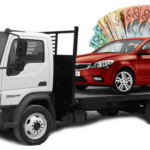
How to Avoid Being Scammed While Selling Your Car?
Selling a car can be an exciting time, as it’s often a sign that you’re ready to upgrade to a newer or better vehicle. However, the process of selling a car can be complicated, especially when it comes to navigating the risks of scams and fraud. The last thing you want is to find yourself on the wrong end of a scam, especially after you’ve invested time and effort into selling your car. This blog will help you understand the most common scams in the car-selling industry and how to avoid them.
Knowing Your Car’s Value:
One of the first things you need to do when selling your car is to get an accurate valuation of its worth. This will help you avoid scams in which a buyer offers you a price that’s significantly lower than your car’s market value. To get an accurate valuation, you can use online tools such as Kelly Blue Book or Edmunds, or you can consult a professional appraiser.
Protecting Your Personal Information:
When selling a car, it’s important to protect your personal information. Scammers often use tactics like posing as a buyer and asking for personal information such as your Social Security number, driver’s license number, and bank information. Do not provide any personal information until you’re absolutely sure that the buyer is legitimate. Additionally, you should avoid providing your home address to potential buyers, as this information can be used for identity theft.
Be Wary of Unsolicited Offers:
One of the most common scams in the car selling industry is the unsolicited offer. This occurs when a buyer contacts you out of the blue with an offer to purchase your car, often with a deposit or payment in advance. In many cases, the buyer is a scammer who is trying to steal your car or money. To avoid this scam, it’s best to only work with buyers who have contacted you through a reputable source, such as a classified ad site or a dealership.
Avoid Wire Transfer Scams:
Another common scam in the car selling industry is the wire transfer scam. This occurs when a buyer sends you a large sum of money in advance and asks you to wire the money back to them for some reason. In reality, the buyer has used a fake check or stolen credit card information, and you will be held responsible for the money once it’s discovered. To avoid this scam, always use a secure payment method such as PayPal or a secure escrow service.
Be Careful with Test Drives:
When selling your car, it’s common to allow potential buyers to take it for a test drive. However, this can also be a scam. Scammers may take advantage of the test drive to steal your car or to use it for illegal activities. To avoid this scam, always accompany the buyer on the test drive and make sure they have a valid driver’s license. Additionally, it’s a good idea to take down their contact information and the license plate number of their vehicle.






